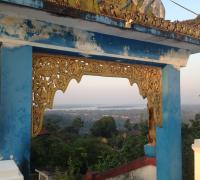Yale Professor James C. Scott at DIIS
Professor James C. Scott from Yale University is a renowned scholar of anthropology and political science, who has had a tremendous influence on critical thinking about everyday resistance, state-formation and alternative politics. Among his major books are “Seeing Like a State”, “Weapons of the Weak”, and the “Art of not being Governed”. Throughout his carrier, Professor Scott has focused on the voices and practices of ordinary people and challenged top-down state-centric schemes of ordering.
On 24 May, Professor James C. Scott visited DIIS to give a talk about public historical memories in countries that have experienced severe oppression, atrocities and conflict. Drawing on references to public memory initiatives in Germany, Russia and the United States, James C. Scott particularly reflected on what a public memory agenda for Myanmar could look like.His main message was that history writing should come from below and involve a wide participation of ordinary people and civic movements across the whole of Myanmar. A popular history movement will not only help avoid that the central government and the military suppress and exclude popular memories of atrocities and oppression. It can also have political effects at the most local level, which are crucial to the future democratization of Myanmar:“If people have the sense of participating in the writing of their own histories, even if it is local histories, it will change them politically”, according to Scott. “This is what makes democrats.”
“If people have the sense of participating in the writing of their own histories, even if it is local histories, it will change them politically. This is what makes democrats.”
A public history should draw on archives and use monuments but should also rely extensively on the oral memories of ordinary people, across a variety of localities where history is experienced in different ways. Memories of larger resistance events and atrocities by the Burmese military are crucial, but so are localized experiences of for instance prisons, forced relocations, landgrabs, everyday corruption, and deprivation. Such memories will uncover crimes against the population as well as reveal those forgotten heroes who have fought for democratization and against military oppression. Rather than a national integrated history, a popular history movement includes histories of local towns, local military units, and individual witnesses.
At the seminar on 24 May, participants in the audience expressed concern that oral historical memories would ignite renewed violent conflict in Myanmar (and other similar contexts), as evidence of oppression and atrocities come out in the open. Professor Scott expressed the view that the Myanmar government’s current focus on reconciliation risks suppressing critical and lively debates in Myanmar and that popular historical memories can help reverse this tendency. He suggested to begin with less sensitive topics that would unlikely have violent repercussions but maintained that memories of past conflicts and atrocities must become public to enable deeper political change.
Professor James C. Scott’s visit to DIIS was part of a four-day workshop and seminar on everyday justice and transition in Myanmar, organized by the DIIS-coordinated EverJust project. He has been engaged with Myanmar since 1960 and has recently established the Independent Journal of Burmese Scholarship that aims to publish new and critical research on Myanmar and to promote the work of Myanmar scholars. The most recent issue features articles by the EverJust researchers.
The whole speech by James C. Scott and the following debate can be seen here on livestream.
DIIS Experts


